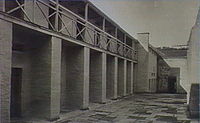The Cascades Female Factory, a former Australian workhouse for female convicts in the penal colony of Van Diemen's Land, is located in Hobart, Tasmania. Operational between 1828 and 1856, the factory is now one of the 11 sites that collectively compose the Australian Convict Sites, listed on the World Heritage List by UNESCO.[2]
 Cascades Female Factory, circa 1914–41 | |
 | |
| Location | South Hobart, Tasmania |
|---|---|
| Coordinates | 42.8938°S 147.2993°E |
| Status | UNESCO World Heritage Site |
| Security class | Former female factory, penal colony |
| Opened | 1828 |
| Closed | 1856 |
| Managed by | Port Arthur Historic Site Management Authority |
| Website | www |
| Type | Cultural |
| Criteria | iv, vi |
| Designated | 2010 (34th session) |
| Part of | Australian Convict Sites |
| Reference no. | 1306 |
| Region | Asia-Pacific |
| Place ID | 10,851[1] |
Collectively the Australian Convict Sites represent an exceptional example of the forced migration of convicts and an extraordinary example of global developments associated with punishment and reform. Representing the female experience, the Cascades Female Factory demonstrates how penal transportation was used to expand Britain's spheres of influence, as well as to punish and reform female convicts.
Now operational as a museum and tourist attraction, the site is managed by the Port Arthur Historic Site Management Authority. The Cascades Female Factory Historic Site consists of three of the original five yards. It is open every day (except Christmas) and offers a range of tours.
History
Some rooms in the Macquarie Street Gaol served as a temporary Hobart "Female Factory" in the mid-1820s.[3] The Cascades Female Factory was purpose-built in 1828 and operated as a convict facility until 1856. It was intended to remove women convicts from the negative influences and temptations of Hobart, and also to protect society from what was seen as their immorality and corrupting influence. The Factory was located, however, in an area of damp swamp land, and with overcrowding, poor sanitation and inadequate food and clothes, there was a high rate of disease and mortality among its inmates.
The Cascades Female Factory is the only remaining female factory with extant remains which give a sense of what female factories were like. It is included on the Australian National Heritage List.[4] It was inscribed on the World Heritage list in July 2010, along with ten other Australian convict sites.[2]
History and Interpretation Centre development
Between 2018 and 2019, almost 35,000 people visited the site.[5] A design competition for a new History and Interpretation Centre was won by an international team composed of Tasmanian practice Liminal Studio, international firm Snøhetta and Melbourne landscape architecture practice Rush Wright Associates in 2018.[6] In 2020, the State Government committed $3 million towards the new $5 million Visitor and Interpretation Centre to enhance the storytelling experience and increase visitation.[7] The Federal Government contributed the remaining $2 million.[8]
The Cascades Female Factory Historic Site was re-opened in March, 2022 with the launch of the new History and Interpretation Centre, with Honourable Madeleine Ogilvie MP and Honourable Dame Quentin Bryce delivering keynote speeches.[9]
Gallery
- Inside the sandstone wall remains of one of the yards (2009)
- A painting of Cascades Female Factory in 1844 by John Skinner Prout
- Cascades Female Factory-Degraves Street view
- Cascades Female Factory-Yard 4 entry
- Cascades Female Factory-Yard 4
- Cascades Female Factory-Middle yard
- An interpretation of the Quilt made by women on the Convict ship Rajah
- Cottage in Yard 4
- From the Shadows statue out front of Cascades Female Factory
See also
References
External links
Wikiwand in your browser!
Seamless Wikipedia browsing. On steroids.
Every time you click a link to Wikipedia, Wiktionary or Wikiquote in your browser's search results, it will show the modern Wikiwand interface.
Wikiwand extension is a five stars, simple, with minimum permission required to keep your browsing private, safe and transparent.









